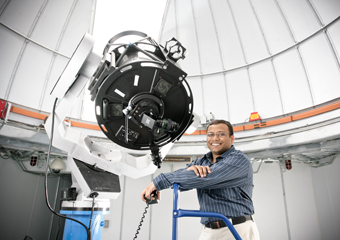Archisman Ghosh
Ph.D. Student
by Rebekah Tilley
photos by Richie Wireman
Archisman Ghosh’s fascination with astronomy was born on a roof in Calcutta. He still looks at the sky, but now he does it through a 20-inch telescope on the roof of UK’s parking structure #2.
A third-year graduate student in the UK Department of Physics and Astronomy, Ghosh focuses his scholarly work on String Theory, and through his Graduate Assistantship at the MacAdam Student Observatory is able to help young astronomy students experience the thrill of first laying their own eyes on a planet.

“My previous experience in astronomy was mainly from amateur activities – stargazing and backyard telescopes,” Ghosh said. “UK's MacAdam Student Observatory gave me an opportunity to have a more professional encounter with the subject. We have superior equipment. We are involved with students actually taking courses in astronomy, and our job is to try and relate what they learn in class to what they see through the telescope. I am also getting a few hands-on lessons in astrophotography from our observatory director, Tim Knauer."
Ghosh is a recipient of UK’s highly competitive Presidential Fellowship for the 2009-2010 academic year that releases the recipient from teaching responsibilities to spend the year pursuing dissertation research. Ghosh will spend his year studying gravitational aspects of String Theory. If it sounds mind-bending, that’s because it is.
“I sometimes ask my advisor, what am I really doing? And he says, ‘You never know what you are doing until you have already done it.’ So I’ve stopped asking,” Ghosh laughs.
He then launches into a detailed, accessible description of his research in String Theory. “Einstein’s gravity is a very beautiful theory, but it has problems,” Ghosh explains, in his distinctive Indian cadence. “The great thing about it is the theory itself predicts when it is going to fail. These failures are at places we call singularities.” Examples of such singularities are the Big Bang in the early universe and those present in the interiors of black holes.
“These singularities pose a major problem in physics since we do not know how to formulate physical questions in their presence,” Ghosh said. “Initial singularities like the Big Bang are especially disturbing because there is no way for an observer to bypass them. What comes to our rescue is String Theory, a consistent quantum theory of gravity.”
Ghosh is working with a hypothesis that has emerged out of String Theory, called the gauge-gravity correspondence. The claim of the correspondence is that certain problems in gravity can be exactly mapped to problems in a dual gauge theory – a theory quite like the one describing the interactions between fundamental subatomic particles. “This has really been a major step towards bringing together gravity and gauge theory – now we see that gauge theory and gravity are actually two sides of the same coin.” Ghosh and his collaborators have been trying to understand the behavior of certain gravitational singularities in the light of this correspondence. Here gauge theory is telling them something new. “The initial singularity that is present in the gravitational theory happens to be absent in the ‘dual’ gauge theory due to quantum effects that the gravitational theory did not take into account,” Ghosh explains.
Ghosh came to UK from India to study with his advisors Sumit Das and Al Shapere. “The group here is small but it is very strong,” he said. “Both Sumit and Al are quite well-known and very good people to work with. You can talk to them about anything – that’s research, that’s physics but not research, that’s not physics at all. It’s a nice place and a nice atmosphere.”
It’s clear that Ghosh has a profound sense of gratitude toward his parents, both professors of Bengali Literature, for the role they played in his career path. “They taught me Bengali, but they instilled in me the desire to pursue Physics.”
How? By showing him the sky from the rooftop.
